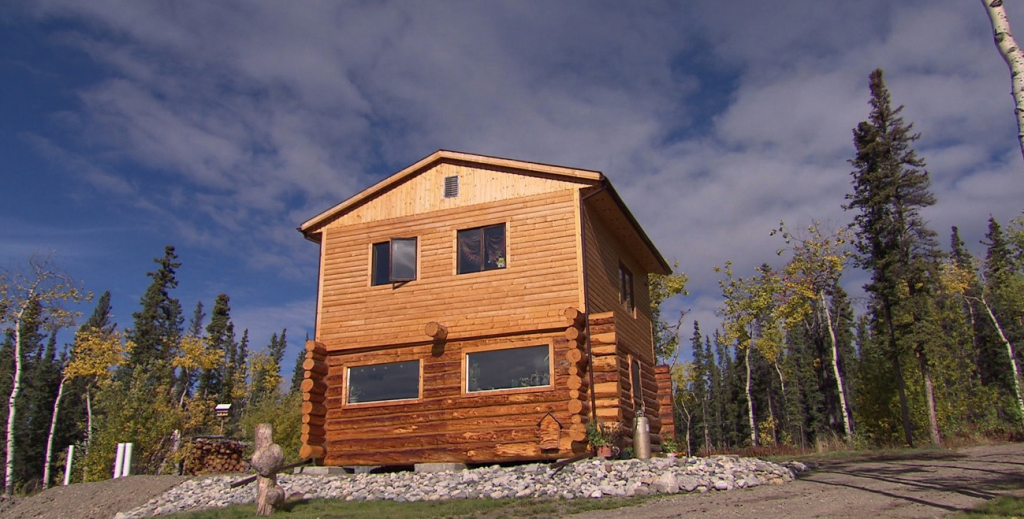Log house for sale? Who’s buying?
Couples, hunters and families search for Yukon real estate
Advertisement
Couples, hunters and families search for Yukon real estate
 The ice cold arctic. Home to the rough and ready—and the backdrop to a number of popular reality TV shows including three of my favourites Gold Rush, Deadliest Catch and Yukon Men. (Others include: Ice-Road Truckers, Alaska-The Final Frontier, Escaping Alaska, Bering Sea Gold (aka: the angriest gold miners on planet earth), Alaska Monsters, Wild West Alaska (on Animal Planet), Railroad Alaska and Edge of Alaska.)
Enter one more: Yukon For Sale.
The show is less day-to-day survival and more about enduring the house hunt in one of Canada’s remotest territories. Not a bad premise given how difficult it is to come up with an original concept when it comes to real estate reality TV shows. (Added feature: Canadian Country music singer George Canyon narrates this wild real estate ride that takes viewers out into the middle of North America’s untamed wilderness.)
Premiering Saturday, June 13 at 9 p.m. EST (6 p.m. PST) the 30-minute show follows house hunting Yukoners, both native and newbies to the north, who are in search of unique properties to satisfy their northern living needs. Already there’s a young couple seeking an off-the-grid existence, hunters with their sights set on a backyard full of game, and urban professionals hoping to find a condo in the middle of a northern town. It’s a show about finding the perfect pad in a place where moose outnumber people by two to one.
In the episode I reviewed, Joe and Shelly are parents of two little tykes and they’re looking for a log home with off-the-grid potential and close to the Aurora Borealis. (He’s a photographer who specializes in shots of the Borealis. Tough job but someone’s got to do it.) Housing prices for the three options they considered ranged from $449,000 to $695,000—so no rock-bottom deals for real estate hunters here.
One of the features I liked most about the show were the tidbits of information that pop up during your voyeuristic tour of the couple’s house hunting. For instance, did you know the Yukon is home to the Great Klondike International Outhouse Race. Yeah. You read right: That’s an outhouse on wheels racing other outhouses. It’s billed a one-of-a-kind event and I believe it!
Yukon for Sale airs on Saturdays at 9 p.m. EST on Corus Entertainment (CMT) channels. Unfortunately, the premier goes up against Stanley Cup NHL Finals—it’ll be tough to rip Canadians away from their beloved sport that night—and against HGTV’s Income Property. But for a unique real estate perspective—and to learn fascinating tips, like install a metal roof so the slides down instead of an asphalt roof where you have to shovel the snow off—tune into Yukon for Sale.
The ice cold arctic. Home to the rough and ready—and the backdrop to a number of popular reality TV shows including three of my favourites Gold Rush, Deadliest Catch and Yukon Men. (Others include: Ice-Road Truckers, Alaska-The Final Frontier, Escaping Alaska, Bering Sea Gold (aka: the angriest gold miners on planet earth), Alaska Monsters, Wild West Alaska (on Animal Planet), Railroad Alaska and Edge of Alaska.)
Enter one more: Yukon For Sale.
The show is less day-to-day survival and more about enduring the house hunt in one of Canada’s remotest territories. Not a bad premise given how difficult it is to come up with an original concept when it comes to real estate reality TV shows. (Added feature: Canadian Country music singer George Canyon narrates this wild real estate ride that takes viewers out into the middle of North America’s untamed wilderness.)
Premiering Saturday, June 13 at 9 p.m. EST (6 p.m. PST) the 30-minute show follows house hunting Yukoners, both native and newbies to the north, who are in search of unique properties to satisfy their northern living needs. Already there’s a young couple seeking an off-the-grid existence, hunters with their sights set on a backyard full of game, and urban professionals hoping to find a condo in the middle of a northern town. It’s a show about finding the perfect pad in a place where moose outnumber people by two to one.
In the episode I reviewed, Joe and Shelly are parents of two little tykes and they’re looking for a log home with off-the-grid potential and close to the Aurora Borealis. (He’s a photographer who specializes in shots of the Borealis. Tough job but someone’s got to do it.) Housing prices for the three options they considered ranged from $449,000 to $695,000—so no rock-bottom deals for real estate hunters here.
One of the features I liked most about the show were the tidbits of information that pop up during your voyeuristic tour of the couple’s house hunting. For instance, did you know the Yukon is home to the Great Klondike International Outhouse Race. Yeah. You read right: That’s an outhouse on wheels racing other outhouses. It’s billed a one-of-a-kind event and I believe it!
Yukon for Sale airs on Saturdays at 9 p.m. EST on Corus Entertainment (CMT) channels. Unfortunately, the premier goes up against Stanley Cup NHL Finals—it’ll be tough to rip Canadians away from their beloved sport that night—and against HGTV’s Income Property. But for a unique real estate perspective—and to learn fascinating tips, like install a metal roof so the slides down instead of an asphalt roof where you have to shovel the snow off—tune into Yukon for Sale.
Share this article Share on Facebook Share on Twitter Share on Linkedin Share on Reddit Share on Email